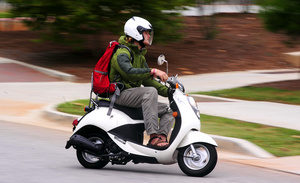 Scooter riders at the University of Georgia may see stricter safety policies governing use of the little two-wheeled vehicles on the Athens campus — but some officials would like to see broader changes in scooter regulation and a lot more public awareness.
Scooter riders at the University of Georgia may see stricter safety policies governing use of the little two-wheeled vehicles on the Athens campus — but some officials would like to see broader changes in scooter regulation and a lot more public awareness.
University officials may study whether to change campus rules regarding scooters, UGA President Michael Adams told Tim Bryant of local radio station WGAU-AM last week.
Scooter safety has been a big discussion topic for Bulldogs fans lately after a string of injuries — some very serious — to UGA athletes.
Baseball recruit Chance Veazey was paralyzed in a 2009 scooter wreck — the most serious injury, but by no means the only one.
A scooter injury sidelined baseball pitcher Eric Swegman for six weeks this spring, and this summer, Bulldog football players missed practice time because of scooter injuries.
But it’s not just athletes who get hurt on scooters, said UGA Dean of Students William McDonald.
“If they are not maintained and operated more judiciously, they have more potential for injury than other vehicles,’ he said.
According to UGA traffic safety researcher Carol Cotton, UGA and Athens haven’t gotten their minds around scooters just yet.
“Right now with scooters, we probably haven’t done as good a job as we could have done in actually defining in the minds of the community what is a scooter, and what are the rules scooters operate in,” said Cotton, a professor in UGA’s College of Public Health.
Some people are certain scooters are like bicycles; others think they’re a kind of motorcycle.
But neither is correct: A scooter is different from both in important ways, and has its own unique dangers, Cotton said.
Like a bicycle, scooters tend to be small enough to be nearly invisible sometimes to drivers in cars or buses.
But they can also travel fairly rapidly — and balance is different, in some ways more precarious — on a scooter than on a bicycle or motorcycle.
“We need to take it seriously, that scooters can be dangerous. These are not toys,” Cotton said. “It’s a life-or-death sort of thing.”
But right now, many scooter drivers aren’t very well trained in operating the two-wheelers, and Athens four-wheel drivers still aren’t used to them.
By contrast, motorcycle drivers tend to be very safe drivers, according to UGA Police Chief Jimmy Williamson. Unlike scooter drivers, motorcyclists have to take extra driver training to get a motorcycle driver’s license. Scooter riders should take extra training, too, Williamson said.
“You would never see a motorcycle rider doing some of the things we see people do on scooters,” Williamson said — things like zig-zagging in the roadway, wearing flip-flops and shorts, which don’t offer much protection, or even driving on sidewalks.
“They’ll try driving in areas we don’t allow automobiles,” said Williamson. Sooner or later, Williamson believes, Georgia will change the state laws that govern scooters, written originally for a now-rare vehicle called the moped, which has a motor but also pedals like a bicycle.
But it’s unfair to single out scooter drivers, he said.
“We see just as many accidents with bicycles and pedestrians. A lot of people are engaged in their day-to-day activities and are not aware of their surroundings,” he said.
Even when scooter operators drive safely, they can be scary for folks like bus drivers, said UGA campus transit director Ron Hamlin.
Like bicycles, scooters are tiny in a rear-view mirror.
“You can cover them up with a pencil,” Hamlin said.
“It’s incredibly easy to miss these kinds of vehicles,” Cotton said.
“They just move faster and it doesn’t take a lot for a driver to miss them,” Hamlin agreed.
UGA seems to have solved one scooter problem, however.
University officials changed the parking policies and space for scooters last year, moving the parking away from sidewalks and giving scooter operators more places to park.
This year, UGA Parking Services manager Don Walter is getting fewer complaints from scooter riders, and fewer complaints from pedestrians and people using wheelchairs who said they had to dodge scooters crossing the sidewalk to a parking space.
“We think that was a big safety improvement,” said Walter.
Not all UGA students think scooter riders ought to be more tightly restricted or educated, but Casey Carden does.
Carden, a junior from Braselton, teaches race-car driving on the side, and sees pit crew members and race car drivers zipping around on scooters at race tracks.
Even racing professionals don’t always take the danger seriously, Carden said.
“It has the potential to go bad real fast,” he said.
– Lee Shearer – [email protected]
Posted September 8, 2011.






